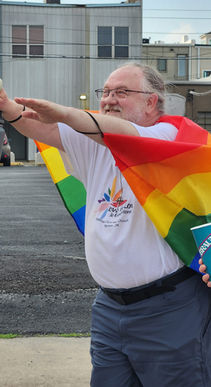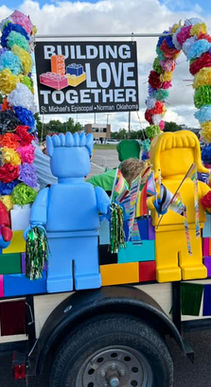

PRIDE 2024
LGBTQ+ Resources
You Are Welcome in the Episcopal Church
Question: What does the Bible say about being LGBTQ+?
Answer: That God loves LGBTQ+ people!
The over-arching themes of the Christian Bible are that God loves everyone and has reconciled everyone through Jesus Christ; this includes LGBTQ+ individuals. “For God so loved the world that he gave his one and only Son, that whoever believes in him shall not perish but have eternal life.” (John 3:16) “The world” means everyone, including LGBTQ+ people.
Nothing can separate us from the love of God (Romans 8:38-39) This message is for all people, including LGBTQ+ individuals.
God did not make a mistake when He created you. “For you created my inmost being; you knit me together in my mother’s womb. I praise you because I am fearfully and wonderfully made.” (Ps 139:13-14) Sexuality and gender identity are components of a person’s inmost being, and as such are part of who God made each of us to be.
God values all people, including LGBTQ+ people. “Do not fear, for I have redeemed you; I have called you by name, you are mine.” (Isaiah 43:1)
On Inclusion
God welcomes people of all genders and sexualities. “There is neither Jew nor Gentile, neither slave nor free, nor is there male and female, for you are all one in Christ Jesus.” (Gal 3:28) Also “…God has shown me that I should not call anyone impure or unclean.” (Acts 10:28) Jesus gladly socialized with people who were shunned by the religious establishment (Matt 9:10).
The Church needs its LGBTQ+ members “The human body has many parts, but the many parts make up one whole body. So it is with the body of Christ.” (1 Cor 12:12)
The early church welcomed non-gender-conforming people. One of the first recorded baptisms by the apostles was of an Ethiopian eunuch. (Acts 8:27)
Jesus warned against using anti-gay slurs. The NIV translation of Matt 5:22 reads “anyone who says to a brother or sister, ‘Raca,’ is answerable to the court”. The original Greek text does not include “sister”, and the word “raca” is most likely a transliteration of the Aramaic word “rakkah”, which is the feminine form of the adjective that means “to be tender, weak, or soft”, so this would be comparable to calling a man a “sissy” (or worse).
On Relationships
Love is a gift from God: “But the fruit of the Spirit is love…Against such things there is no law.” (Gal 5:22-23)
God made us to be in relationship with Him and with each other: "it is bad for man to be alone" (Gen. 2:18) It would be inconsistent with God’s loving nature to create people who were gay and then condemn them to a life of loneliness. Heterosexual marriage is presented as an example (rather than a definition) of how God puts people in relationships.
God creates community and families, uniting people together: 'So they are no longer two, but one. Therefore what God has joined together, let man not separate.’ (Matthew 19:6). God can and does create unions with all types of people, including LGBTQ+ individuals.
Celibacy is good if one is called to it, but it is not for everyone (Mt. 19:11-12); marriage is good too ("better to be married than to burn with passion" 1 Cor 7:9)
Examples of love between people of the same gender in the Bible
David and Jonathan. “After David had finished talking with Saul, Jonathan became one in spirit with David, and he loved him as himself.” (1 Samuel 18:1) David says of Jonathan: “Your love for me was wonderful, more wonderful than that of women.” (2 Samuel 1:26).
Ruth and Naomi - Ruth expresses her devotion to Naomi with, “Wherever you go, I will go; wherever you live, I will live. Your people will be my people, and your God will be my God . Where you die I will die, and there I will be buried. May the LORD deal with me, be it ever so severely, if even death separates you and me.” (Ruth 1:16-17).
The Centurion and his servant (Matt 8:5-10). The word used for “servant” here, “pais”, was commonly used to describe a servant who was a romantic partner of the master.
On Gender
All people, including LGBTQ+ individuals, were created in God’s image: “So God created human beings in his own image, in the image of God he created them;male and female he created them.” (Genesis 1:27) This also tells us that God is at least two genders. “Male” and “female” are examples of genders, not an all-inclusive list, just as birds are mentioned as an example of animals that fly, but not bats.
There are several heroes of the Bible who were non-gender-conforming:
Jacob preferred to stay with the women and cook. (Genesis 25)
Joseph’s “ornate robe” is described by the same Hebrew word used elsewhere in the Bible to mean a garment worn by princesses. (2 Samuel 13:18)
Deborah (Judges 4-5) was a judge of Israel at a time when women were valued only for childbearing.
Hegai, the eunuch in charge of the palace women in the story of Esther, helped Esther to become queen.
The Bible contains feminine images of God, in addition to the masculine metaphors of “Father” and “King”.
God’s wisdom in Proverbs is personified as female (Proverbs 1:20, 8:1, 9:1).
Many references to God describe actions associated with women: nurturing life in the womb (Psalm 139:13), giving birth (John 3:5-6), and protecting children (Matthew 23:37).
Many early interpreters believed that Adam was androgynous, representing aspects of the archetypal human.
The Talmud recognizes six genders that are non-binary or intersex, in addition to male and female.
Bible verses that have been used to condemn LGBTQ+ people, examined in light of their original context
Genesis 19:1-13 The Sodom & Gomorrah story is preceded by examples of Abraham and Lot being very welcoming to strangers. The lack of hospitality and the desire to do violence to the visitors were considered grave transgressions, regardless of the gender of the visitors. The reference in Jude 1:7 (King James version) to “strange flesh” likely refers to the fact that the angels they wanted to assault were not human. Ezek 16:49: “ Now this was the sin of your sister Sodom: She and her daughters were arrogant, overfed and unconcerned; they did not help the poor and needy.”
Leviticus 18:22 The literal translation of the original Hebrew is less clear: “And with male you shall not lie lyings woman.” The word translated as “lyings” is found elsewhere only in Genesis 49:4, where it refers to incest. In Leviticus 18, this verse comes in a list of prohibitions against having sex with family members, so it is reasonable to conclude that it is a prohibition against incest.
Romans 1:26-27 Here, Paul is condemning the sinful and harmful acts he perceives in Roman culture at the time. Since same gender and non-heterosexual attractions occur naturally, this condemnation is not directed at LGBTQ+ people. In Romans 2:1, Paul condemns those who misuse God’s teachings to condemn others.
1 Corinthians 6:9 and 1 Timothy 1:9-11 The original Greek translation indicates that this deals with male prostitution and pedophilia. The word “homosexual” is not found in the Bible in translations written prior to 1946, indicating that it was likely added as a result of the translators’ own biases and prejudices.
Deuteronomy 22:5 The word translated as “clothing” here, keli, is translated elsewhere as “armor”, and the word translated as “man”, geber, actually means “warrior”. This indicates a prohibition against intent to deceive by disguising oneself.
Matthew 19:4 The point of the scripture Jesus quotes is that God made people to be in relationship.
Criteria by which God evaluates our lives
Jesus says nothing indicating that being gay or trans is a sin.
John 8:7 - “Let he who is without sin cast the first stone.” Throughout the Bible,
God warns against casting judgments upon others.
Mark 12:30-31 - “Love the Lord your God with all your heart and with all your soul
and with all your mind and with all your strength. The second is this: ‘Love your
neighbor as yourself. There is no commandment greater than these.”
Matthew 25: 34-36 - “Then the King will say to those on his right, ‘Come, you who
are blessed by my Father; take your inheritance, the kingdom prepared for
you since the creation of the world. For … I was a stranger and you invited me
in”.’”
John 6:39 - “And this is the will of him who sent me, that I shall lose none of all
those he has given me.” God would not want LGBTQ+ people to be driven away
from the church or lose their faith.
There are only seven passages that have been used to justify bias against LGBTQ+
people, but there are over a hundred about love – Let us all focus on love!
Additional Resources
To find an LGBTQ-affirming church near you, you can use the gaychurch.org directory.
For an in-depth look at the “clobber passages”, this article reassures Christians who want to honor God’s word that the Bible does not condemn loving, consensual same-sex relationships. This website also includes links to many helpful LGBTQ resources.
Whosoever.org contains many essays written by Christians who are LGBTQ+. This article explores the reasons that some people have trouble accepting transgender individuals.
Material Provided by St. Hugh of
Lincoln Episcopal Church, Elgin, IL















